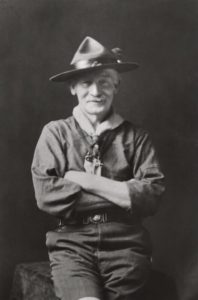LORD ROBERT BADEN POWELL (1857-1941)
Lord Robert Baden-Powell (1857-1941) founded Scouting at the beginning of the 20th century in England. His educational intuitions relying on active education and on education of the young by the young still remain today at the heart of the method. The Scouting method has contributed (and continues to do so!) to the education of millions of young people throughout the world.
A boy unlike the others
Robert studied at Charterhouse school. Discipline was strict and, as soon as he could, the young boy would take refuge in the woods that lay just behind the school and were forbidden to the pupils. He had to use elaborate tricks to escape from the teachers’ rounds. This did not stop him from inventing many games, watching for animals and cooking small game on “smokeless fires” in order not to be spotted. He was seen as a pupil paying attention and ready to play, a good and creative fellow, however, not a genius. With his brothers, he often had the opportunity to explore the countryside, to camp and to canoe. His childhood gave him sound training for life in the open air and resourcefulness.
His military career

In 1876, he opted for a military career. He was second at the entrance exam, which surprised everyone. Lieutenant in the Indian Army, he developed his gifts for sports, observation, disguising and life in the open. For some time, he was an intelligence agent in Russia. Then, he became a colonel in 1899, and commanded the 1,000 men of the Mafeking garrison in South Africa, besieged by 10,000 Boers.
The siege lasted 217 days, during which B.P. multiplied tricks, even using young boys as messengers, observers and sentries. The resistance of the Mafeking besieged people was carefully followed by all the British media. The town was freed on May 16th, 1900, which turned B.P. into a national hero. Named General Major, he organised the South-African mounted police.
From the beginning of his military career, he insisted on developing the spirit of initiative and the sense of observation in his soldiers’ training. He himself became an excellent military scout and trained numerous scouts: at the outposts of the troops, they had to identify the way and possibly locate the enemy, and they had to be able to manage in hostile or unknown territory.
“Aids to Scouting”
B.P. published his observations on “scouting” (the art of military scouts) in 1899 in a small booklet meant for militaries: “Aids to scouting”. We do not know how the British Army welcomed this book. But we do know that when B.P. came back to England he was quite surprised to discover that his book was very famous among educators and young boys; it inspired their games and activities, and even their observation activities in some schools’ programmes.
As a colonial soldier, he cared for the greatness of England. To him, this depended on every one’s health, education and good citizenship. He was struck when he discovered the contrast between the young population of suburbian London, which were in bad health, had nothing to do and often were offenders, and the young soldiers, whom he had contributed to train on both continents, and who were sound and vigorous, and open. He had also noticed when he had employed Mafeking teenagers as messengers and scouts during the siege (to save men for the defence of the ramparts) that the boys were solid and capable of great things, as long as one knew how to talk to them and one really trusted them.
Many boys wrote to him and he never failed to answer his readers thoroughly. All this prompted him to start work and to contemplate the use of all the techniques he had experienced during his campaigns to put them at the service of the boys in a prospect of peace.
The birth of Scouting
In August 1907, he went to Brownsea Island with about twenty boys for an experimental camp. He made up patrols of five boys led by one of them, and made them practise through games the exercises recommended by his method. The boys and B.P. considered the results to be excellent. So then, chapter by chapter, B.P. published a book called “Scouting for boys”. In the author’s mind, this book viewed as “the bible of scouting” would offer youth clubs and organisations a new education method. The fruit of his experience, this method is based on a law, a promise, on patrol life and activities in the open. Very soon, millions of copies of this handbook about “citizenship at the school of nature through woodcraft” were sold.
As soon as “Scouting for Boys” was published, boys spontaneously formed their own patrols, more and more often away from the existing institutions. Without really wanting to, B.P. had to organise this budding movement. With the help of King Edward VII, he left the Army in 1910 and dedicated all his time to scouting. Then, his life blended with the history of world scouting and guiding.
Peace scouts
Let us also remember that Baden-Powell’s life ended in Kenya, on January 8th, 1941. He named his home “PAXTU”, a neologism that could mean: peace to you, or peace with you. For the main feature of scouting as invented by Baden Powell is to educate children and young people of all races, languages, cultures, religions and social conditions, to become – contrarily to the soldiers whom he trained – “peace scouts”, that is to say happy, useful, and active men and women, at the outposts of life. Scouting, which has been expanding constantly since its creation, is undoubtedly the largest non-political and independent education organisation in the world, based on volunteers. Every scout, every guide, individually and collectively at all the levels of the association, try to be faithful to the founder’s ultimate message:
“Try and leave this world a little better than you found it”.